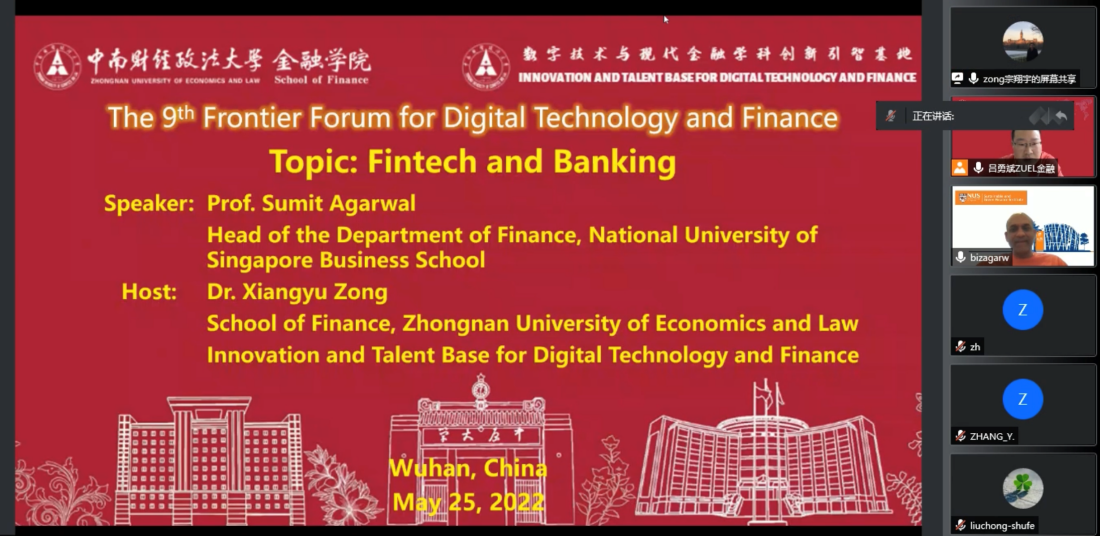The ninth Frontier Forum for Digital Technology and Finance, sponsored by the Innovation and Talent Base for Digital Technology and Finance, was convened successfully online on May 25, 2022. Professor Sumit Agarwal, Dean of finance, NuNUS Business School, was invited to give a lecture on "Fintech and Banking". The lecture was presided over by Dr. Xiangyu Zong, a researcher at the base and from the Department of Investment, School of Finance.

Professor Agarwal introduced the relationship between finance, regulation, and deep tech to reveal the technological transformation that tech companies could bring to financial services. Fintech companies leverage new technologies such as blockchain, big data, machine learning, and AI to reduce cost, optimize market divisions, create economies of scale, and enhance the experience of users. The market share of fintech has continued to increase, which is triggered by technology growth and the support of funds.
He stated that traditional commercial banks were facing strict regulation, limiting their ability to innovate. Fintech companies, on the other hand, are able to reform themselves in a relatively free market environment. Due to their ability to originate underwriting, lending, financing, and risk costs controlling, the number of alternative fintech lenders has witnessed a significant increase.
Professor Agarwal then showed some evidence from India and Singapore. The digitization of banks around the world has been motivated by the evolution of payment methods from commodities to coins, banknotes, bills, credit cards, ATMs, online payments, and mobile payments. Based on the evolution of payment methods, Professor Agarwal asked the following questions: (1) Does the depletion of cash lead to an increase in the level of digitization of payments? (2) Is demonetization successful in making inroads into the payment habits of consumers? (3) What are the economic and non-economic factors that lead to heterogeneity in the response?
In India, although payment technology has developed rapidly, it still maintains a cash-based economy. This is could be attributed to lower internet penetration, financial illiteracy and limited access to formal banks, data privacy, etc. Based on data from digital payment method providers (bank debit cards and E-wallets) and demanders, the authors found that on the supply side, India's E-wallets are not growing faster than bank debit cards. On the demand side, non-cash payment methods have risen significantly after demonetization.
Singapore has a relatively mature banking and payment system. As of 2016, 60% of daily transactions were still carried out using cash payments. In 2017, Singapore began its transition to a paperless economy, with mobile wallets playing a dominant role. After the introduction of QR code payment into mobile wallets, mobile payments have doubled both in the amounts and the number of transactions, which were mainly on small scales. The results based on the DID model showed that paperless payments could lead to more consumption and streams.
After the lecture, the audience had an academic discussion with Professor Agarwal. Dr. Xiangyu Zong thanked Professor Agarwal for the explanation.
Speaker Introduction
Sumit Agarwal is the Low Tuck Kwong Professor at the School of Business and Professor in the departments of Economics, Finance and Real Estate at the National University of Singapore. Previously, he held positions as a Professor of Finance at Georgetown University, senior financial economist in the research department at the Federal Reserve Bank of Chicago and a senior vice president and credit risk management executive in the Small Business Risk Solutions Group of Bank of America. Dr. Agarwal's research interests include issues relating to financial institutions, household finance, behavioral finance, international finance, real estate markets, urban economics and capital markets. He has published over eighty research articles in journals like the American Economic Review, Quarterly Journal of Economics, Journal of Political Economy, Journal of Finance, Journal of Financial Economics, Review of Financial Studies, Management Science, Journal of Financial Intermediation, Journal of Money, Credit, and Banking among others. Additionally, he has co-written a book titled Kiasunomics and co-edited a collected volume on Household Credit Usage: Personal Debt and Mortgages.
Frontier Forum for Digital Technology and Finance
Recent years have witnessed a dramatic acceleration in a digital revolution in economic sectors and a rapid adoption of the new generation of information technologies, such as artificial intelligence, blockchain, cloud computing, big data, etc. These technologies effectively set off the digital economy. It has become a key driving force in creating global economic growth, improving the modernization level of governance capabilities, and promoting high-quality economic development in China. In particular, digital finance is the most important part of the digital economy. To explore the development direction of the cross-integration of digital technology and finance, the Innovation and Talent Base for Digital Technology and Finance is hosting the “Frontier Forum for Digital Technology and Finance”, in collaboration with the School of Finance, Wenlan School of Business, Economics School, School of Information and Safety Engineering, School of Statistics and Mathematics, School of Public Finance and Taxation of Zhongnan University of Economics and Law (ZUEL). This lecture series will invite the well-known scholars at home and abroad in digital technology, digital economy, digital finance, and other related fields as guest speakers, providing an open and cutting-edge academic exchange platform for interdisciplinary research on digital technology and finance.
